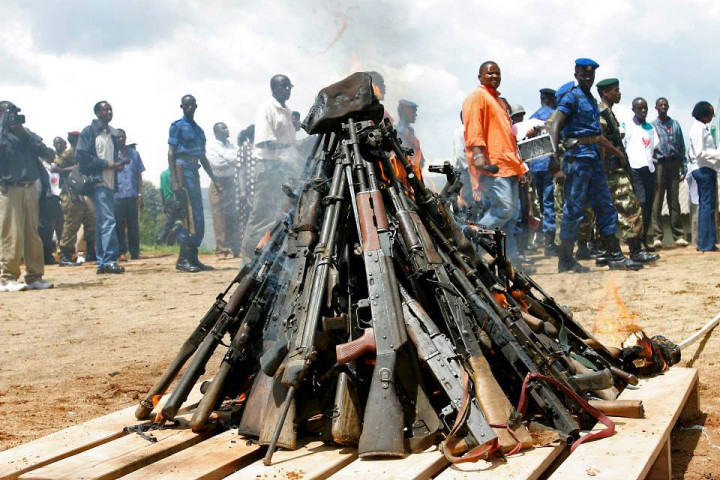New York – The United Nations disarmament chief on 6 April 2015 urged Member States to work actively and seek common ground on disarmament issues related to nuclear weapons and conventional arms amid a period of increasing global tensions and violence.
Addressing the opening of the 2015 substantive session of the Organization’s Disarmament Commission (UNDC) in New York, UN High Representative for Disarmament Affairs Angela Kane warned gathered delegates that efforts to reduce the global circulation of weaponry had stalled and that the prospects of nuclear disarmament were particularly “dim.”
“I have never seen a wider divide between nuclear haves and nuclear have-nots,” declared Kane.
She added that the “schism” continued to act as a “significant” obstacle to non-proliferation and underscored the need “to bridge the fissure” between Member States while noting that the world’s brewing conflicts had fed the increasing proliferation of conventional weapons.
Nonetheless, she continued, in the midst of “these dark clouds,” she had also seen some “genuine bright spots,” including the complete removal of all chemical weapons from Syria.
Moreover, the bringing into force of the landmark Arms Trade Treaty (ATT) could also be considered a “major achievement” for the international community, she said, as it ensured that all actors in the arms trade complied with international standards.
The Commission, whose membership is universal, is a deliberative body mandated to make recommendations in the field of disarmament and to follow up the decisions and recommendations of the General Assembly’s first special session devoted to disarmament, in 1978.
Between 1979 and 1999, the Commission was able to reach consensus at least 16 times to adopt guidelines or recommendations on disarmament subjects.
Source: ICAN-International Campaign to Abolish Nuclear Weapons
Despite the overall chiaroscuro of disarmament progress, Ms. Kane warned that the commission itself needed to ramp up its efforts in working for non-proliferation, stating that it had become “disheartening to see the commission develop into an annual box-checking exercise.”
To that point, she said, she “encouraged and cajoled” the commission to take up its “integral part” in the UN machinery and work “actively” to seek compromises to achieve common ground.
Kane observed that in an ever-complicated international security environment, the disarmament commission had an increasingly important function to deliberate and contribute to the enhancement of global security.
What is needed is the political will of Member States “to take us out of the current morass,” she concluded. (*Source: UN).
Read also:
Spending on Nuclear Weapons — US$105 Billion a Year; US$300 Million a Day, US$12 Million an Hour
Tactical Nuclear Weapons in Europe – The Dangers Are Very Great Today
Nuclear Weapons Abolition – “NATO” Is Not an Excuse
Nuclear Weapons Abolition – ‘US Attempts to Bully Allies into Inaction’
Tell Your Bank Not to Invest in Nuclear Weapons!
Initiative on Humanitarian Impact of Nuclear Weapons Takes Centre Stage at UN General Assembly
‘The Damage Caused by Past Nuclear Testing Cannot Be Reversed’
Nuclear — Despite Price Dip, Uranium Demand, Production Continue to Rise
UN Officials Call for Renewed Global Commitment to Ending Nuclear Tests
Do You Have the Courage to Ban Nuclear Weapons?
Why Is the Total Elimination of Nuclear Weapons So Urgent?
Hiroshima: The Myth of “Military Necessity”
Inhumane, Illegal, Immoral and Cruel: a Survivor Account of the Hiroshima Bombing
Anti-Nukes Move from Norway to Bahrain The NPT’s “Unacceptable and Continuous Failure”: Egypt Walks Out
Fed Up With Empty Promises, The Arab May Abandon Nuclear Non-Proliferation Treaty
Middle East Nuclear Free Bid Moves to Finland – Yet Another Lost Chance?
Nuclear Free Middle East “High Priority” Nuclear Free Middle East — Necessary Yet Impossible
Middle East — France’s Fuzzy Face on Nuclear Abolition
‘Strong UN Commitment’ to Nuclear-free Middle East Conference
Which Countries Have Nuclear Weapons and How Many?
Banks, Pension Funds, Insurance Companies in 30 Countries ‘Invest’ Your Money in Nuclear Arms
‘Humanity Could Not Survive a Nuclear War Using Even a Fraction of Existing Arsenals’
Another Lost Chance to Save Middle East from Mass Destruction
Watch The Sky–It May Rain Atomic Bombs
Nuclear Terrorism – Killing 100,000 People Not Very Difficult
Humanitarian Consequences of Nuclear Weapons — Are You Ready to Hit the Gas?
Ecocide, a Catastrophic Consequence of Nuclear Weapons
“Breaking the Nuclear Chain” Campaign
Pressure to Push the Nuclear Genie Back in the Bottle
Germany Resolved to Pave the Way to Nuclear Disarmament
India, Pakistan Engaged in World’s Most Active Nuclear Arms Race
World Nuclear Forces: ‘Fewer But Newer’ Weapons
Desert “Star Wars”, Respect Dignity of Life
Nuclear Dangers, The World Is “One Minute Closer to Midnight” U.S. Spending on Atomic Bombs Doubles UN Budget
Of Dr. Strangelove and the Risk of Using Atomic Bombs World Campain Against False ‘Nuclear Deterrence Doctrine’
The Story of Child Yami and the Atomic Bomb
Obama and How to Save a Quarter of a Trillion Dollars
You Choose: $105 Billion a Year for Health Care or Nuclear Weapons?
Will Israel Attack Iran … Really?
Top US Military Commander: ‘I Don’t Want to Be Complicit’ if Israel Attacks Iran
US Defense Secretary Warns of ‘Pearl Harbor’ Cyber Attack by Iran
Legally-binding Arms Trade Treaty Enters Into Force – Will States Implement It?
‘Most Ships Involved in Arms and Drugs Trafficking Are Based in Western Countries’
‘Authorized’ Small Arms Trade, Up to USD 8.5 Billion .. Per Year
2015 Human Wrongs Watch











